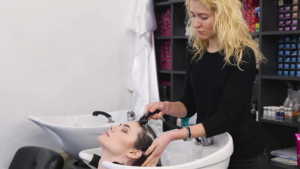Thick, luxurious hair is frequently seen as a sign of energy and excellent health. However, not everyone is endowed with thick hair by birth, and a number of variables, including nutrition, stress, heredity, and environmental deterioration, can cause thinning hair. Thankfully, there are a number of practical methods that might assist in getting hair that seems denser. This post will go over four essential steps you can do to improve the appearance of your hair and give it a fuller, more vibrant look. These pointers will support you in achieving the appearance of thicker hair, from appropriate hair care practices to lifestyle adjustments.
Adopt a Healthy Hair Care Routine
A good hair care regimen is one of the most important elements of having denser-looking hair. Using the proper shampoo and conditioner for your hair type is part of this. Choose thickening or volumizing products to give your hair more lift and body. Additionally, it’s critical to routinely wash your hair to get rid of product buildup, extra oil, and grime that can make your hair appear flat. Avoid over-washing your hair, though, since this can deplete its natural oils and cause breakage and dryness.
To strengthen and nourish your hair, add an intensive conditioner or hair mask to your regimen once a week in addition to washing. Steer clear of tight hairstyles, heavy heat styling, and harsh chemicals since they can lead to breakage and damage to hair. Rather, use mild hair care techniques, including air drying, combing with a broad tooth comb, and using heat protectant sprays as needed.
Nourish Your Hair from the Inside Out
Healthy hair development originates within, and the key to encouraging denser-looking hair is a balanced diet full of vital nutrients. Since keratin, a kind of protein makes up the majority of hair, make sure your diet contains enough of it. To promote hair strength and development, include lean meats, eggs, seafood, nuts, and legumes in your diet. The omega-3 fatty acids in walnuts, flaxseeds, and seafood are also good for thickening hair and sustaining a healthy scalp.
Zinc, iron, vitamins A, C, and E, as well as vitamins, minerals, and biotin, all have a major impact on hair health. These nutrients help to produce sebum, the natural oil that lubricates the scalp and encourages the growth of healthy hair. Should you suspect that your diet may be lacking in these essential nutrients, consider taking a daily multivitamin or a hair-specific supplement. Additionally, by giving the appearance of density, procedures like scalp micropigmentation for women can improve the look of thinning hair. Maintaining overall health and the brilliance of hair also depends on drinking plenty of water to stay hydrated.
Explore Topical Treatments and Hair Growth Products
The availability of topical remedies and hair growth products intended to improve hair density has increased dramatically in recent years. These products frequently include peptides, biotin, caffeine, and minoxidil—ingredients that stimulate hair follicles encourage hair growth, and lessen hair loss. Specifically, minoxidil is an over-the-counter medication that the FDA has authorized to treat hair loss. It functions by delaying the hair follicles’ development phase, which eventually leads to thicker, fuller hair.
Consider utilizing volumizing mousses, sprays, and style products to give your hair volume and lift in addition to topical treatments. These items can improve the look of hair generally and provide the appearance of thicker hair. If you’re worried about hair loss or thinning, it’s crucial to adhere to the directions on any hair growth therapies and see a dermatologist or other healthcare provider.
Practice Stress Management and Self-Care
One important element that might cause hair thinning and loss is stress. Excessive stress can cause the hair development cycle to be disturbed, which can result in decreased hair density and more hair loss. Thus, it’s essential to maintain healthy hair by implementing stress management practices into your everyday routine. Deep breathing techniques, yoga, meditation, and regular exercise can all help lower stress levels and improve general well-being.
Sleep is also necessary for the body to heal and rebuild, which includes hair follicle regeneration. Aim for seven to nine hours of good sleep every night. Additionally, think about including hair-healthy self-care practices like scalp massages. Hair follicle stimulation, blood circulation, and hair growth can all be enhanced by scalp massage. For extra nourishment and advantages, use natural oils during your scalp massage, such as coconut, castor, or jojoba oil.
Conclusion
It is possible to achieve denser-looking hair by following the proper diet, hair care routine, and general well-being. You may improve the way your hair looks and your confidence by implementing a healthy hair care regimen, feeding your hair from the inside out, using topical treatments, and managing your stress. Keep in mind that sustained results require perseverance and that hair growth is a slow process. You may embrace your inherent beauty and have healthier, fuller-looking hair with perseverance and effort.
copyright-free image: thicker hair





Be First to Comment